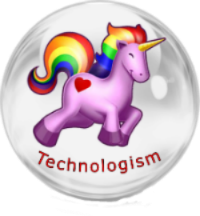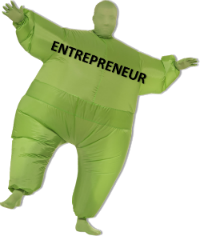People are cursed with the infatuation gene. When strong emotions blind them, they inflate the values of cars, homes, tulip bulbs (in 1637 Holland), stocks, other people, and, let’s not forget, technology — resulting in illogical overpayments that they later regret.
 Widespread overpayments cause bubbles, which eventually burst, sending prices into the ground. The aftermath is always the same, when the victims ask, How did this happen?
Widespread overpayments cause bubbles, which eventually burst, sending prices into the ground. The aftermath is always the same, when the victims ask, How did this happen?
We’re experiencing yet another technology bubble. Utopian unicorn-chasers — engineers, investors, tech evangelists, reporters, and seminar hucksters — believe that technology solves all problems, real and imagined. I call their religious zeal technologism.
Newsflash: Technology not only doesn’t solve all problems, if often creates them. Frequently, a simple conversation solves more than elaborate technology ever could.
Technologism begets the tech bubble, which I call techflation, and lots of products that never should see the light of day. Example: Do you need a smartphone app that tells you to lose weight? You can download several. What happened to the mirror, the belt, the bathroom scale?
Insane valuations of tech startups abound. Stewart Butterfield, cofounder of Flickr and now CEO of software vendor Slack, opined to Sarah Lacy at a San Francisco conference in March: “It’s arbitrary as fuck. There’s no logic to what you get valued at.”
At about the same time, BloombergBusiness wrote: “Here’s the secret to how Silicon Valley calculates the value of its hottest companies: The numbers are sort of made-up.”
As I cited in Be Unique or Be Ignored: The CEO’s Guide to Branding, 75% of startups fail. Why not? They sing the ode to technologism and its progeny, techflation. CEOs of brand-centric (versus product-centric) companies, however, don’t contribute to bubbles.
The Root
Blame venture-capital (VC) firms, which capitalize and hypervalue tech startups. Organized around technology (versus problems that need solving), the VC firm actively spreads and sustains technologism — and drives techflation.
The root of this behavior: lack of risk, the universal clarifier.
VCs can make many bad investments and keep receiving funds from insurance companies, universities, and pensions. Founders of startups risk almost none of their own money and can walk away unscathed from failed ventures.
Without the prospect of failure and loss haunting company founders and their investors — risk — precise customer targeting, verified utility, and purchase validation aren’t priorities. Why not, then, build superfluous products for fun and glory? It’s happening. Hence, techflation.
Aiding the VCs, the sycophantic media are constantly hyping tech products, tech firms, and tech CEOs — instead of skeptically analyzing them. And, not just TechCrunch. Mainstream business media are equally guilty. Latest example: the Apple Watch. Why buy advertising when giddy reporters and their publications will evangelize for you. Indeed.
Incubated Techflation
 The VCs and media can’t perpetuate technologism and techflation without the vaunted entrepreneur.
The VCs and media can’t perpetuate technologism and techflation without the vaunted entrepreneur.
Vaunted? Do you think I’m exaggerating? Read Inc. magazine’s “4 Top Trends From This Year’s Most Brilliant Young Entrepreneurs.”
Where’s the critical thinking, the skepticism? AWOL. They are mutually exclusive with technologism.
Because of this veneration, an endless line of inflated entrepreneurs, or revered hobbyists who build cool stuff, seek — and get — investment funding.
Time for a vocabulary review. What is an entrepreneur? Someone who takes risk, especially financial risk, to create and run a company that provides a unique, customer-validated solution to a real problem.
Scenario A: Man buys the corner dry-cleaner shop, taking over the expenses and paying the seller, in installments, from a guaranteed revenue stream.
Is he an entrepreneur? Absolutely not. A proprietor, yes. Entrepreneur, no. Nothing unique. No risk. Is he called an entrepreneur? Yes. Does he consider himself an entrepreneur? Yes. Are investors beating down his door to motivate him to buy similar businesses? No. Will the media hype him or his company? No.
Scenario B: Woman moves into an incubator, where she gets free office space, amenities, and access to a free CPA, a free lawyer, and free selling advice. She builds a product, based on super-cool technology, that solves no real problem. She’s under no pressure. She can’t articulate a clear, concise, compelling message — but nobody cares.
Is she an entrepreneur? Absolutely not: no risk, no unique solution to a real problem, no brand. Is she called an entrepreneur? Yes. Does she consider herself an entrepreneur? Yes. Will VCs clamor to fund her? Yes. Will the media hype her and her product? Yes. In fact, she is an inflated entrepreneur, the byproduct of incubated techflation.
Incubators have become riskless sandboxes for technotinkerers, under the inflated ruse of entrepreneurship, fostering a plethora of products in search of problems — most of which will be massive wastes of time and capital: 80% of apps in Apple’s App Store are zombies, languishing in obscurity.
Parting Advice to CEOs
If you want to experience real success, become a real entrepreneur, not an inflated one: take risk, create a product that solves a real problem, and make branding your #1 priority.
Never accept any investor’s technologism and penchant for jargon, the true antithesis of branding, and never follow the crowd — just because it seems cool.
All bubbles are born from infatuation, and they all pop. Don’t ever inhabit one.
POSTSCRIPT #1: Dumb ‘Smart’ Gadgets: The Bubble Is Set to Burst
POSTSCRIPT #2: We’re in a Gluten-free Bubble That Is About to Burst
POSTSCRIPT #3: Tech Froth Has Some Investors Talking Bubble
POSTSCRIPT #4: VCs Have Built-In Immunity for When the Impending Tech Bubble Bursts
POSTSCRIPT #5: Kickstarter Funds Water Bottle for Utopians Devoid of Thirst Instinct
POSTSCRIPT #6: TechCrunch: Tech in Denial About Imminent Bursting of Investment Bubble
POSTSCRIPT #7: Why Millennials Aren’t Starting Businesses
POSTSCRIPT #8: Millennials Describe Themselves as Self-absorbed and Wasteful
POSTSCRIPT #9: Helicopter Parents Begat Generation of Traumatized Wusses
POSTSCRIPT #10: Fortune: Fear, Sadness, Dying Unicorns in Silicon Valley (10.09.15)
POSTSCRIPT #11: Reuters: Silicon Valley’s IPO Party Is Winding Down (10.16.15)
POSTSCRIPT #12: Theranos Is Latest Result of Unskeptical, Fawning Media
POSTSCRIPT #13: Fortune: Tech IPOs are in Trouble. Good Luck Getting Out (01.21.16)
© 2015 Marc H. Rudov. All Rights Reserved.
About the Author

Marc Rudov is a branding advisor to CEOs,
producer of MarcRudovTV, and author of four books

